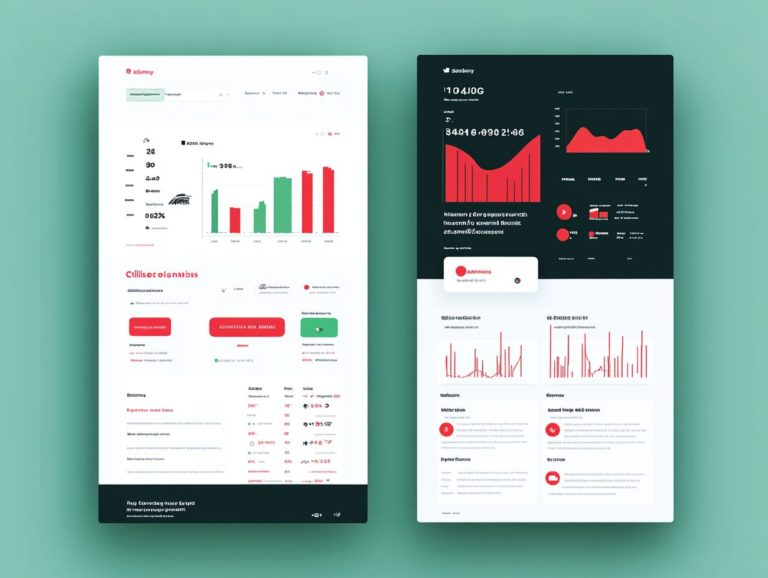The Importance of Personalization in Marketing
Let's Set Up Your Lead Generation Strategy
Fill out the form below, and our team will get in touch with you to create a tailored solution for your business.
In today s competitive landscape, personalization stands as a cornerstone of effective marketing strategies for you. Dive into this article to unlock the secrets of personalization in marketing! By diving deep into customer preferences and behaviors, you can craft experiences that truly resonate on a personal level.
This article highlights the essence of personalization, its benefits for enhancing customer engagement, and the challenges businesses like yours face in implementing these strategies.
You’ll discover practical approaches to personalization, metrics for measuring success, and the emerging trends that will shape the future of marketing. Embark on this journey to uncover how you can harness the power of personalization to elevate your marketing efforts.
Contents [hide]
- Key Takeaways:
- Understanding Personalization in Marketing
- The Benefits of Personalization
- Let's Set Up Your Lead Generation Strategy
- Challenges of Implementing Personalization
- Effective Personalization Strategies
- Let's Set Up Your Lead Generation Strategy
- Measuring the Success of Personalization
- Future of Personalization in Marketing
- Let's Set Up Your Lead Generation Strategy
- Frequently Asked Questions
- What is the importance of personalization in marketing?
- How does personalization benefit businesses?
- What kind of data is needed for effective personalization in marketing?
- Does personalization only apply to digital marketing?
- What are some examples of personalization in marketing?
- How can businesses get started with personalization in marketing?
Key Takeaways:

- Personalization plays a crucial role in modern marketing strategies, allowing businesses to create tailored experiences for their customers.
- Implementing personalized marketing can lead to improved customer experiences and influence purchasing decisions, ultimately driving sales and customer loyalty.
- While there are challenges in implementing personalization, such as data collection and cost, utilizing effective strategies and measuring success can help businesses overcome these obstacles and stay ahead of the curve in the ever-evolving world of personalized marketing.
Understanding Personalization in Marketing
Grasping the nuances of personalization in marketing is crucial for any business aiming to elevate user experience and cultivate enduring customer relationships. As consumer expectations shift, a well-articulated personalization strategy not only meets these demands but also enriches the overall brand experience.
By using data to guide marketing efforts and employing cutting-edge marketing technology, you can craft bespoke content that truly resonates with your audience. This targeted approach pairs well with audience segmentation, which simply means dividing your audience into groups based on their interests, enabling you to effectively engage specific demographics and foster greater engagement and customer loyalty.
Defining Personalization and its Role in Marketing
Personalization in marketing is all about crafting tailored content that speaks directly to your audience. By utilizing customer data and audience segmentation, you can enhance their experience and engagement.
This approach allows you to forge deeper connections with your target audience by delivering messages that resonate with their individual preferences and behaviors. By tapping into customer data like browsing history, purchase patterns, and demographic insights you can segment your audience into distinct groups. This lets you create specific campaigns that directly address the needs and interests of various segments, ultimately nurturing loyalty and boosting conversion rates.
When done effectively, personalization not only elevates customer satisfaction but also reinforces your brand identity in a competitive landscape, making it an essential part of any modern marketing strategy.
The Benefits of Personalization
The benefits of personalization significantly elevate the customer experience and cultivate brand loyalty through tailored messaging and personalized content across diverse marketing channels.
Embracing this strategy allows you to connect with your audience on a deeper level, ensuring that your communications resonate and leave a lasting impression.
Improved Customer Experience
Improving your customer experience through personalized marketing can lead to greater user engagement and a stronger alignment with consumer needs. This approach tailors interactions to suit your individual preferences and behaviors, making you feel both understood and valued.
By analyzing data from your previous purchases, browsing habits, and demographics, brands can create content that truly resonates with you. For example, a renowned online retailer might leverage your browsing history to recommend products that match your tastes, significantly increasing the likelihood of a purchase.
Personalized email campaigns featuring curated suggestions can capture your attention and inspire action, transforming what could be a one-time visit into a lasting relationship. As you encounter relevant content and offers, you re naturally more inclined to engage with the brand, ultimately enhancing your overall experience.
Influence on Purchasing Decisions

Let's Set Up Your Lead Generation Strategy
Fill out the form below, and our team will get in touch with you to create a tailored solution for your business.
Personalization plays a pivotal role in shaping purchasing decisions. It delivers relevant product recommendations and tailored content that resonates with your unique preferences.
When you feel understood by a brand, your engagement is more positive. This makes you feel valued, which is essential for meaningful interactions. Businesses can use this information to understand your buying habits. This insight lets them suggest products that meet your needs and excite you about your choices!
Targeted marketing campaigns that embrace these insights create a genuine sense of connection. You can envision how these offerings enhance your life. As a result, this personalized approach boosts conversion rates and fosters long-term loyalty. It turns one-time shoppers into repeat customers who become passionate advocates for the brand.
Challenges of Implementing Personalization
Implementing personalization in marketing comes with its fair share of challenges. You ll need to navigate the intricacies of data collection and privacy concerns. At the same time, balance costs and resource allocation.
It s essential to approach these obstacles with care to ensure a seamless and effective strategy.
Data Collection and Privacy Concerns
Data collection plays a crucial role in personalization. However, it also brings significant privacy concerns that marketers must navigate carefully to uphold customer trust.
Understanding consumer behavior and preferences allows you to tailor your offerings effectively. But this often entails gathering sensitive information. Customers today are increasingly prioritizing their privacy. This shift calls for a thoughtful reevaluation of how you collect and manage data.
Transparency is essential. You must clearly communicate your data practices and the reasons behind gathering information. Ethical data handling protects individual privacy and fosters a trusting relationship between your organization and consumers. It’s vital to respect customer autonomy; this respect is key to cultivating loyalty and engagement.
Cost and Resource Allocation
Cost and resource allocation are pivotal considerations for marketers aiming to implement effective personalization strategies within their marketing stack.
Navigating these financial intricacies requires a comprehensive understanding of both short-term and long-term implications for your business. While initial investments in technology, data analysis, and content customization may seem overwhelming, the potential return on investment (ROI) from engaging customers through personalized experiences is undeniable.
Seek out cost-effective solutions that emphasize high-impact tactics. Ensure you gather valuable customer insights to refine your future campaigns. Striking the right balance between spending and benefits can significantly influence the effectiveness of your overall marketing strategy. This balance guides your business toward sustained growth and customer loyalty.
Effective Personalization Strategies
Effective personalization strategies hinge on robust audience targeting and segmentation. This approach allows you to deliver tailored content that resonates with specific customer profiles, enhancing engagement and driving results.
Segmentation and Targeting
Understanding your audience is key. Audience segmentation and targeting are crucial elements of a successful personalization strategy, ensuring that your tailored messaging reaches the right customers through the most effective marketing channels.
By systematically analyzing demographics (age, gender, etc.), behaviors, and preferences, you can effectively categorize your audience into distinct groups. This segmentation goes beyond simple, generalized campaigns; it enables you to create personalized experiences that truly resonate with each segment.
For example, employing data analytics tools (tools that help analyze information for better decisions) can help you identify patterns that reveal which specific messages will engage different demographics. You might find that younger audiences gravitate toward social media platforms, while older consumers respond more favorably to email newsletters.
Let's Set Up Your Lead Generation Strategy
Fill out the form below, and our team will get in touch with you to create a tailored solution for your business.
Crafting tailored messaging enhances relevance and significantly boosts overall engagement, leading to more effective marketing outcomes for your brand.
Using Customer Data to Personalize Marketing
Utilizing customer data effectively is essential for personalizing your marketing efforts and crafting tailored content that resonates with your customers profiles and preferences.
By analyzing different types of customer data, you can gain deeper insights that will shape your marketing strategies. This data can encompass demographics, purchasing history, and online behaviors, all of which act as invaluable touchpoints for customizing your messages.
For instance, imagine a retailer using insights from past purchases to suggest complementary products, or a streaming service analyzing viewing habits to recommend new shows you might love. Leveraging location data can elevate your local marketing initiatives, ensuring your promotions hit home with nearby customers.
By integrating these various types of data, you can create personalized experiences that not only capture attention but also cultivate customer loyalty and engagement.
Measuring the Success of Personalization
Track essential metrics to measure the success of your personalization strategy! Measuring the success of personalization requires tracking essential metrics that reveal how effectively you are optimizing conversions and enhancing overall content performance. By focusing on these indicators, you can gain valuable insights into the impact of your strategies and refine your approach for even better results.
Key Metrics to Track
Key metrics to track for assessing the success of personalization efforts include conversion rates and customer engagement levels.
To truly gauge the effectiveness of your personalized marketing endeavors, it s essential to analyze these metrics in depth. For instance, by tracking conversion rates, you can gain insights into how tailored content influences purchasing decisions, revealing which elements resonate most with your target audience.
Customer engagement levels, measured through interactions like click-through rates and time spent on pages, offer a glimpse into the relevance of your content and the emotional connections you re building. By keeping an eye on overall content performance metrics, you can identify the types of personalized content that drive customer satisfaction and retention, enabling you to refine your strategies for maximum impact.
Future of Personalization in Marketing
Act now to stay attuned to these changes! The future of personalization in marketing is set to evolve, shaped by emerging trends and predictions that resonate with shifting consumer behaviors and technological advancements. You’ll find that staying attuned to these changes will not only enhance your marketing strategies but also deepen your connection with your audience.
Embracing this evolution will allow you to create more meaningful and targeted experiences that truly resonate with consumers.

Trends and Predictions for Personalized Marketing

Current trends and predictions for personalized marketing reveal a compelling shift towards advanced data utilization and a deeper understanding of consumer expectations.
This evolution is not just a passing trend. It reflects major shifts in consumer behavior driven by technology and the pervasive influence of social media.
Let's Set Up Your Lead Generation Strategy
Fill out the form below, and our team will get in touch with you to create a tailored solution for your business.
Businesses are now leveraging artificial intelligence and machine learning to navigate vast datasets. This allows them to craft targeted messages that truly resonate with individual preferences.
With these sophisticated tools at your disposal, you can refine your marketing strategies, ensuring that your content remains relevant and engaging.
Get ready for exciting changes ahead! The use of better data analysis tools is poised to revolutionize how brands connect with their audiences. This will foster relationships rooted in personalization that feels both authentic and valuable.
Frequently Asked Questions
What is the importance of personalization in marketing?
Personalization in marketing is the process of tailoring marketing efforts and messages to specific individuals or groups based on data and insights. It is important because it allows businesses to connect with their target audience on a more personal level, increasing engagement and ultimately driving conversions.
How does personalization benefit businesses?
Personalization in marketing has been shown to improve customer loyalty, increase sales, and enhance customer satisfaction. By providing a personalized experience, businesses can build stronger relationships with their customers and stand out in a competitive market.
What kind of data is needed for effective personalization in marketing?
- Demographics
- Purchase history
- Browsing behavior
- Preferences
This data is used to create targeted campaigns and tailor messages to specific individuals or groups.
Does personalization only apply to digital marketing?
No, personalization in marketing can be applied to both digital and traditional marketing channels. With the rise of technology and data-driven marketing, it has become easier to personalize digital campaigns. However, traditional methods such as direct mail and in-store experiences can also be personalized based on customer data.
What are some examples of personalization in marketing?
Examples of personalization in marketing include targeted email campaigns, personalized product recommendations, personalized website content, and tailored social media ads. These tactics use customer data to deliver relevant and personalized messages to individuals or groups.
How can businesses get started with personalization in marketing?
To start implementing personalization in marketing, businesses should first identify their target audience and gather data on their customers. They can then use this data to create targeted campaigns and messages, and use marketing automation tools to deliver personalized experiences at scale.






